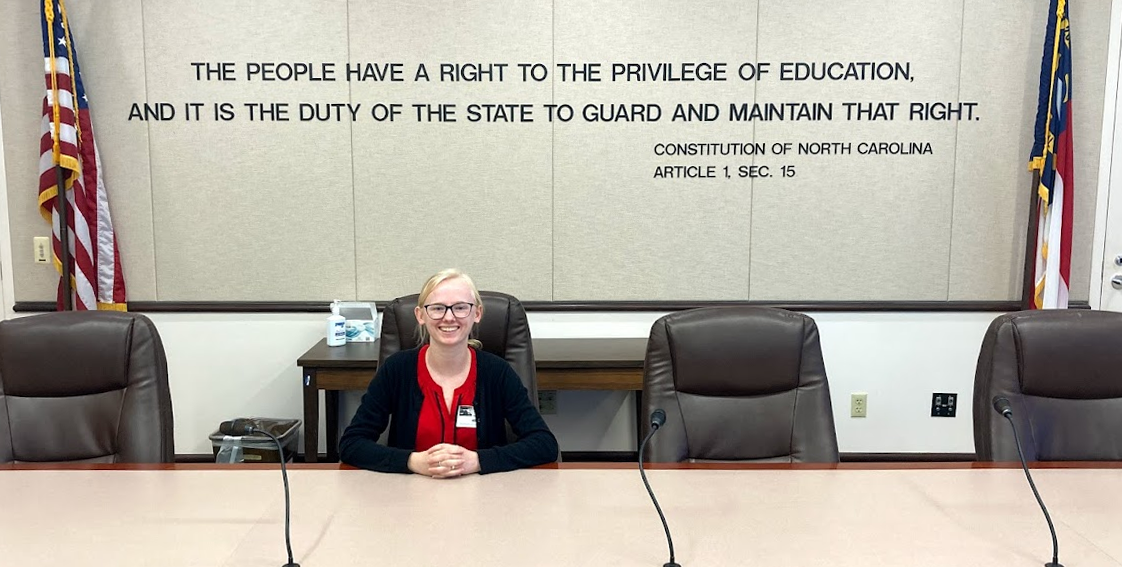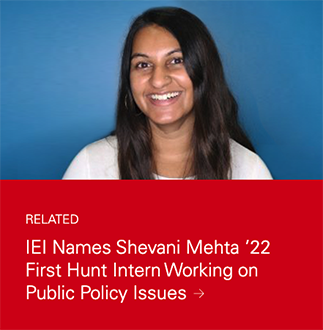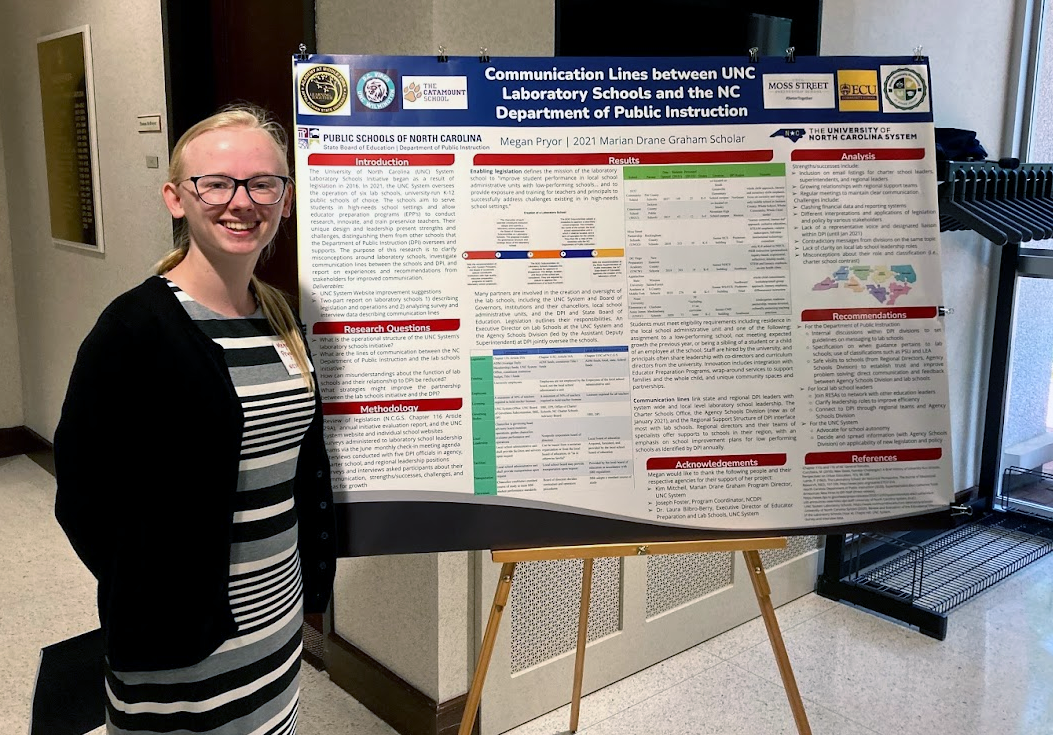
Shevani Mehta ’22 is majoring in economics, international studies, and Spanish and plans to attend law school, while Megan Pryor ’22 is studying mathematics and math education to become a teacher. Despite their distinct academic and professional goals, they were both drawn to the Marian Drane Graham Scholars program. The immersive eight-week summer program provides a handful of rising UNC System juniors and seniors the opportunity to develop leadership skills while gaining a better understanding of issues facing public higher education. Mehta represented NC State in the program in summer 2020 while Pryor participated in the program during summer 2021.
As Marian Drane Graham Scholars, Mehta and Pryor were placed at a state government agency to gain hands-on professional experience as interns. In addition, they met with key North Carolina policy and university leaders and worked on independent capstone projects.
Mehta was drawn to the program when she found out GO Global NC was one of the potential sites. In spring 2020, after the COVID-19 pandemic derailed many study abroad plans, she was interested in the agency’s focus on strengthening economic connections between North Carolina and the global community. “A lot of people don’t have financial access to study abroad, so I studied how to create on-campus programming with a global focus,” she explained.

Pryor was also enticed by the prospect of working at her eventual site, the Department of Public Instruction. Before her internship, she had spent a summer at a math research program and was interested in the opportunity to explore the world of education policy. “The interview was fun and, as a future teacher, I thought this would be a useful experience to better understand how public education and higher education function in North Carolina.”
“An internship is a perfect opportunity to try something you’re not going to do forever, and it’s a chance to figure out what you like and don’t like,” Mehta reflected. She credits her experience with helping cement an interest in higher education public policy and affirming her plan to attend law school.
CEIs Set Scholars Up for Success
Both Mehta and Pryor explained that Park Scholarships Civic Engagement Initiatives (CEIs) — year-long service projects that connect small groups of Park Scholars with local nonprofits to implement solutions to community challenges — prepared them for their experiences as Marian Drane Graham Scholars. “CEIs help you develop teamwork, leadership, and project management experience, a skillset that this program was looking for,” Pryor shared.
Mehta’s interest in education policy was piqued by her CEI with the Institute for Emerging Issues (IEI), which focused on collecting data for Service Year NC, developing inclusive recruitment and training, and cultivating a community among Service Year host organizations. “My CEI got me interested in higher education through Service Year NC and learning opportunities after college,” Mehta shared.
Her experience as a Marian Drane Graham Scholar transformed that spark into a passion. Excited by the multidisciplinary nature of public policy, Mehta is thrilled to continue on this career path. She was recently named the first recipient of the Governor and Mrs. James B. Hunt Internship, a new IEI program for NC State undergraduates interested in a career in public policy and public service.
For her CEI, Pryor worked with the North Carolina Museum of Natural Sciences to assess effective communications and marketing practices, and present ideas to the museum communications team.
“My CEI made me eligible for this program,” Pryor said, referencing the teamwork and project management skills she developed through that project. “The Park Scholarships program’s combination of rigorous scholarly expectations, leadership development resources, and inspiring community has proved invaluable in fueling my goals.”
Mehta participated in the Marian Drane Graham Scholar program remotely and applauds the work the staff did to transition the experience to an online environment. She credits the program with preparing her to succeed in remote and hybrid professional and educational settings. “I learned how to work effectively in a remote environment and I am thriving. You had to make sure you were on top of your internship, program requirements, and meetings with UNC System leadership.”
Pryor’s experience the following summer was mainly online, but she had the opportunity to go onsite for one day. “At the close of the program, I went in for a full day at the Department of Public Instruction and got to actually meet the people that I’d been working with on my research project all summer, so that was really fantastic.”
Capping off the Experience
The scholars both spoke about the impact of their capstone projects. Pryor’s focused on the intersection of higher and lower education, exploring opportunities for UNC System laboratory schools. “Lab schools” are partnerships between lower-performing school districts and universities that result in small university-run elementary and middle schools designed to meet the holistic needs of communities by providing wrap-around services for parents and families.
“A lot of work is needed to clarify misunderstandings and communication shortcomings. There is flexibility to innovate, but it can be unclear which regulations apply to lab schools, which are distinct from both public schools and charter schools,” Pryor said. She prepared a capstone report about the strengths and opportunities for this model and how the UNC System can better support these schools. She was excited that the report was shared with UNC System President Peter Hans and the North Carolina State Superintendent of Public Instruction.
“You don’t have to be an education major to be a Marian Drane Graham Scholar,” Mehta emphasized.
While most of the Marian Drane Graham Scholars in Mehta’s cohort were education majors, in Pryor’s cycle, she was the only person studying education. Pryor agreed with Mehta’s assessment, “Honestly the program is a lot more about government and higher education policy.”
“The cohort was a really cool part of the experience,” Pryor shared. “It was inspiring that the people in this program have a lot of different backgrounds and a lot of different goals, but they are all unified around an interest in the power of higher education and what that looks like for the UNC System in particular.”
That echoes the arrangement of the Park Scholarships program, which connects a cohort of students studying a variety of disciplines at NC State and builds an “incredible community” according to both scholars. Mehta’s favorite aspect of the Park Scholarships program is the close network of students and faculty on campus and the wide network of Park alumni around the world. Pryor extolled the academic diversity of the Park Scholarships network which transcends majors, departments, and colleges. Both talked about the influential relationships they have built with Park Faculty Mentors, Park Faculty Scholars, and Park alumni, as well as their enthusiasm to serve as mentors to underclassmen and future classes of Park Scholars.
Advice for Future Scholars
For students interested in applying for the Marian Drane Graham Scholar program in the future, Mehta and Pryor recommended staying open to potential opportunities. “When preparing for the interview, go into it with ideas for your capstone project and an open mind, and have suggestions for what your research might look like,” Pryor suggested.
“Have an open mind about the program and what you want to do with it,” Mehta encouraged. “You can be unsure about what you want to do and the program will help you discover interests.”

